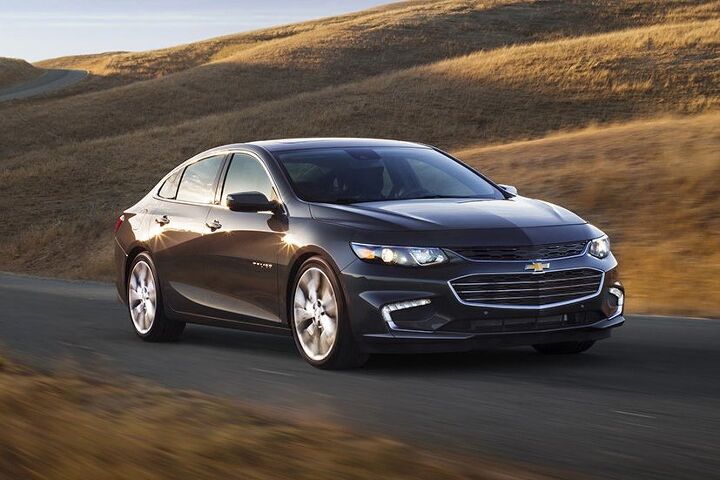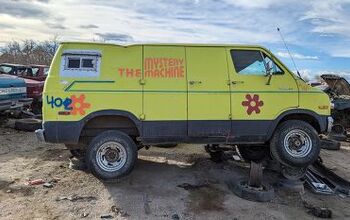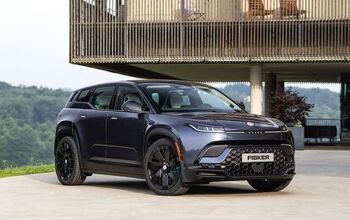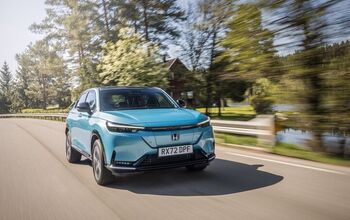Vanishing Act: America's 10 Most Rapidly Declining New Vehicles in 2017
The U.S. auto industry is shrinking. But only by a little bit.
Auto sales through the first five months of 2017 are down just 2 percent, a drop of roughly 140,000 sales across the entire industry. Aside from high inventories and rising incentives, it’s not all doom and gloom. 2016 was the highest-volume year in the history of the American auto industry — a 2-percent drop is hardly catastrophic.
This is therefore not 2009, when virtually every new vehicle suffered decreased volume. Many new vehicles are surging, selling significantly more often this year than last.
But in a declining market, many other nameplates are in fact losing sales. Many sales. We’ve compiled a list of the 10 volume nameplates losing U.S. sales most rapidly.
We drew some guidelines. “Volume” in this instance equals a 30,000-annual sales rate. That’s a total achieved by slightly less than half of all new vehicle nameplates in the 2016 calendar year. Pro-rated, that’s 12,500 sales through the end of May 2017.
By looking at “volume” vehicles, we’ll be able to see where America’s new vehicle sales are truly disappearing. Naturally, demand is supposed to dry up for discontinued models, so we’ve removed from contention, for example, the Jeep Patriot. We also excluded commercial-oriented vans.
Each of the vehicles listed below have their own reasons for losing sales. They all deserve asterisks and explanations. Some reasons are more obvious than others.
For the Chevrolet Impala and Toyota Avalon, declining interest in large cars generally caused declines of 35 percent and 29 percent, respectively. The Chevrolet Malibu climbed to new heights just last year, but General Motors has not been able to sustain that pace as the midsize sedan segment contracts. Similarly, the Hyundai Sonata and Ford Fusion made their way into the top 10.
The third-ranked Honda Odyssey is in a replacement phase. The fifth-generation Odyssey is just going on sale now, and that transition phase severely curtailed sales. As for Kia’s Odyssey-challenging Sedona, which is down 29 percent year-to-date, sales are crumbling in concert with much of the minivan category: minivan sales have also decreased at Toyota and Chrysler, albeit modestly. The Nissan Quest and Mazda 5 have been killed.
The eighth-ranked Ford Mustang has lost 28 percent of its five-month output from 2016, a loss of 14,767 sales for America’s leading sporting car. Competitors from Chevrolet and Dodge, the Camaro and Challenger, are flat, year-over-year. The Mustang reached an eight-year high when it was new in 2015 and was expected, like most two-doors, to tail off after that, particularly with a new Camaro launched the following year. Now, Mustang sales may also be affected by customers who prefer to wait for the upcoming launch of a refreshed 2018 model.
At the top of the heap sits the Jeep Compass. We could say bad things about the Compass. We could critique the failing Jeep. It is, after all, a favorite whipping boy at TTAC.
But the real reason Compass sales are down 58 percent this year relates to a massive changeover at the Jeep brand. Its sibling, the Patriot, is disappearing. The Compass structure, somewhat oddly, includes 2017 versions of both the first-generation Compass and the second.
RankVehicleMay 2017 YTD SalesMay 2016 YTD Sales% Change Compass17,43541,608-58.1% Impala28,50444,055-35.3% Malibu73,087104,187-29.9% Odyssey37,01052,698-29.8% Avalon14,21520,013-29.0% Sedona12,99818,297-29.0% Sonata66,76892,547-27.9% Mustang38,42253,189-27.8% Fusion89,086120,313-26.0% Soul43,62358,299-25.2%Regardless, it’s not at all surprising to see Compass sales crumble. Nor will it be surprising to see Compass sales rapidly elevate as the new model comes on stream.
For now, these 10 models combined for a 30-percent downturn in 2017’s first five months; more lost sales than the market overall. The Lexus ES, Hyundai Accent, BMW 5 Series, Buick Enclave, and Mazda 3 all declined by at least 20 percent compared with early 2016. 24 other continuing nameplates reported double-digit percentage losses, from Ford Focus to the Infiniti QX60.
Meanwhile, some of the most popular vehicles in America — passenger cars, mostly — are also in decline. The Honda Civic, Toyota Corolla, and transitioning Toyota Camry combined to lose 46,220 sales already this year.
Thankfully, pickup trucks and SUVs/crossovers have added 225,000 extra sales.
* A previous edition of this ten-car list included only nine cars. It’s been updated to include the tenth-ranked Kia Soul. The rankings have been updated as a result.
Timothy Cain is a contributing analyst at The Truth About Cars and Autofocus.ca and the founder and former editor of GoodCarBadCar.net. Follow on Twitter @timcaincars.
[Images: Fiat Chrysler Automobiles, Ford Motor Company]
More by Timothy Cain
Latest Car Reviews
Read moreLatest Product Reviews
Read moreRecent Comments
- SCE to AUX "...to help bolster job growth and the local economy"An easy win for the politicians - the details won't matter.
- Kjhkjlhkjhkljh kljhjkhjklhkjh so now we will PAY them your tax money to build crappy cars in the states ..
- SCE to AUX Yes, I'll miss it, and it doesn't make sense to kill off your 3rd-best seller. 2023 was its best year since 2018.
- SCE to AUX This was the same car I had (05 xB, stick, "camouflage" color) for 7 years - great car.We called ours "The Lunchbox". I added aftermarket wheels, and the 3rd-party cruise control the dealers could install.It suffered only two failures: bad window switch in week 2 (dealer fixed in 1 hour), bad trailing O2 sensor (fixed myself for $70). Fuel economy was always 28-34 mpg.It was a potential death trap, and ride quality became unbearable after 2 hours. I once did a 10-hour round trip in it and could barely walk after.Traded it for a 2012 Leaf, which was a better car in some ways.
- Bd2 The "e" nomenclature signifies the e-ATPs which BMW is pursuing.




































Comments
Join the conversation
Much of the loss in sales of midsize sedans is not that they are bad, but that they lost much of their functionality. Much harder to get in and out of, less roomy, less trunk space and many with the coupe like styling have so little headroom in the rear that an average sized person with average height hits their head on the rear glass. The sedans look nice with their sleek roof lines but they are not as comfortable and roomy so people are buying crossovers instead. I myself have no desire to buy another sedan due to what I mentioned above. Small turbo charged 4s do not help either but then many of the crossovers are going to those as well.
It looks as if Ford is cancelling one of the top selling cars in the nation. Jim Hackett must be a real moron.